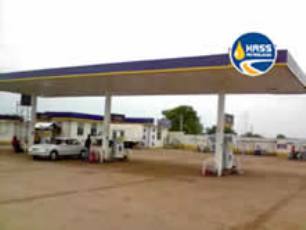South Sudan: Fuel crisis hits, prices soar after referendum
By Julius N. Uma
January 28, 2011 (JUBA) — Widespread fuel crisis coupled with abnormally high prices have hit South Sudan, less than two weeks after the semi-autonomous region successfully concluded its self-determination referendum.

The vote, which largely favored separation, was a key part of Sudan’s 2005 Comprehensive Peace Agreement (CPA); the accord that ended over two-decades of a bloody civil war fought between north and south of Africa’s largest country.
A survey conducted by Sudan Tribune on Friday indicated massive increase in prices of petrol, diesel, kerosene and liquefied petroleum gas, with most station proprietors attributing the catastrophe to inadequate supplies coming from Sudan’s capital, Khartoum.
When we visited Hass, Global and Bass fueling stations positioned in the various locations of the South Sudan capital, Juba, petrol prices stood at SDG 4.5 ($1.5), while diesel and kerosene were at SDG 3.0 ($1 ) and 2.0 (about $0.5) respectively.
The current prices, citizens say, have sharply increased when compared to what these fueling stations charged clients before the referendum period.
Compared with what these stations were charging pre-December period, consumers say that regular gas was at SDG 3.0, Diesel at SDG 2.5 and Kerosene at SDG 1.5.
“We are suffering as you can clearly see for yourself. We have been receiving fuel from Khartoum, but since the time of the referendum, these trucks are not coming to South Sudan. Now we have to rely on fuel supply from East Africa,” said Hassan Mohammad, a Somali national working with Hass fuel station in Juba.
Equally feeling the pinches are motorcyclists, locally known as boda-bodas, who largely depend on the daily operations of these fueling stations for derive their sources of livelihood.
A cyclist only identified himself as Juma, who operates from customs market stage vowed to pack his motorbike should prices of petrol continue soaring in the next few weeks.
“Let me tell you the truth. I will get out of this business completely if the price of petrol does not come down. What shall we save or even take home for our families at the end of the day? Nothing at all,” a visibly sad Juma told Sudan Tribune.
Another cyclist, John Nsereko, stationed at Hai Malakal stage said that following the fuel crisis, he has not been able to make “any difference” from the motorbike that belongs to his boss.
“The whole of last year, I would work very hard and take SDG 30 [$10] to my boss, but these days things have changed. All the money I collect is now spent on fuel and the balance goes to my boss since he is the owner of this motorcycle,” Nsereko, a Ugandan national, said.
On Juba roads, sights of huge tanks, bearing registration numbers from neighboring Uganda and Kenya are common; a clear indication that fuel was being ferried into the region from East Africa.
Official from the regional Ministry of Energy and Mineral resources, have remained cagey on the latest trend of events in the transport sector. Economic analysts, however, contend that this is a temporary problem unlikely to persist for long.
(ST).

Tribe
South Sudan: Fuel crisis hits, prices soar after referendum
To my dear Southerners
It is just few months to go and the issue will be resolve. it has never happen in this planet earth that you, the owner of the well, to not enjoy the fruit of that well at your backyard . Those years are gone, my cousins Arabs. i am here to tell those Arabs proteroleum supplies in khartoum who happen to impede the supply of fuel due to what they called a referandum’s difficulties, that it will not be to long before the course is reverse. instead of southerners decrying the sky-rocketing price of fuel , it would soon be you who will decry it.